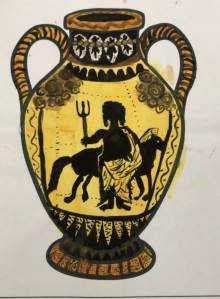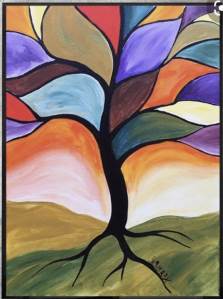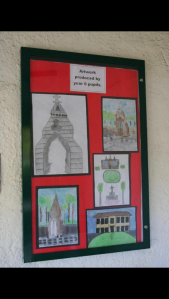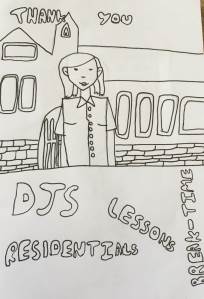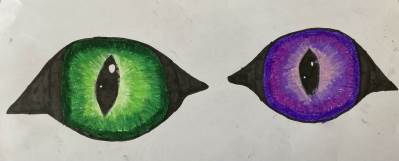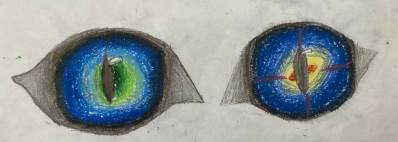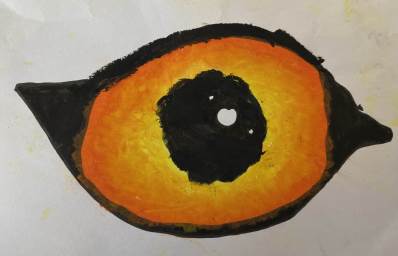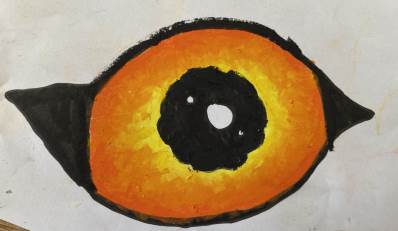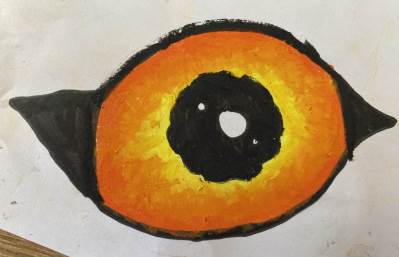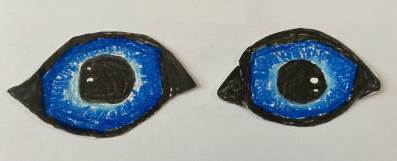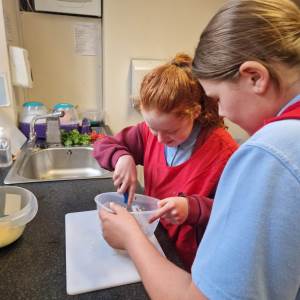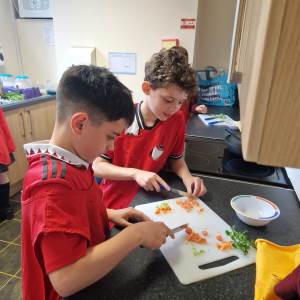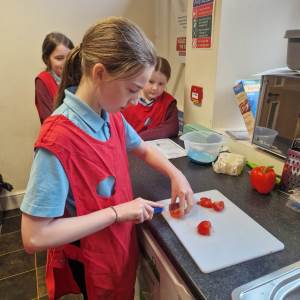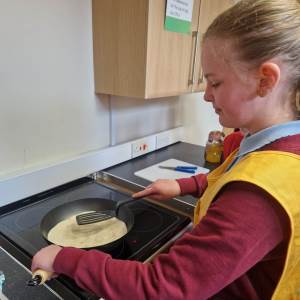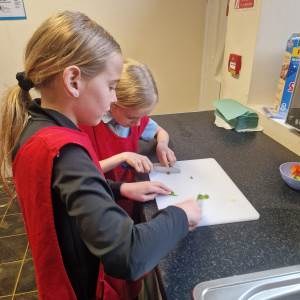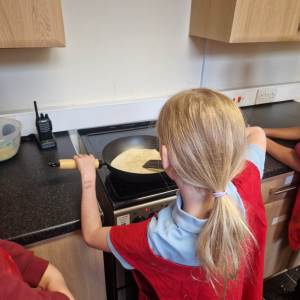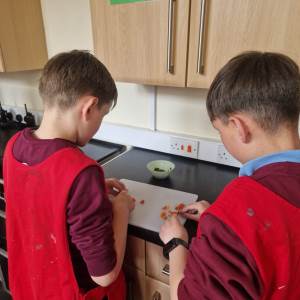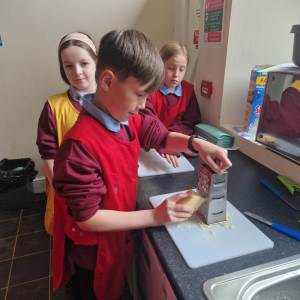-
Creative Arts (Art, Music, Design Technology)
Art
"Every child is an artist. The problem is how to remain an artist when they grow up."
Pablo Picasso
Our Art Lead is Mrs S Weston
Art Intent
At Dronfield Junior School we aim to provide opportunities for all pupils to develop the confidence and skills required to be an artist and to enjoy and appreciate art. Throughout their time in school we ensure there are opportunities to discover an interest and talent in art and to nurture wellbeing.
Successful teaching of art can inspire an enjoyment and curiosity that spans a range of cultures and forms, including our own school community. We encourage children to critically engage with art and evaluate a range of artistic techniques by ensuring that there are opportunities for children to be creative and access a range of artistic skills and techniques.
Our create project begins with a question and links to concept words which have been carefully chosen with a range of art skills and artists (from different periods in history) in mind.
Through our teaching of art we aim to widen children’s vocabulary in terms of technical and descriptive language through their responses to art.
Art Implementation
Art has a high profile within the school community and pupils enjoy regular lessons that are highly valued. A range of skills are taught throughout the year and have strong cross curricular links to other subjects. These skills are then applied to pieces of art produced during the final term during our ‘create’ project.
Art lessons follow a clearly sequenced and progressive program of study based on the National Curriculum objectives, project questions and concept words.
We use a range of resources in our delivery of the art curriculum including: the
use of visitors, access to events taking place in the local community and links with other schools. Pupils are given opportunities to develop a range of artistic skills; to design, create and evaluate.We ensure that our lessons:
• Provide high quality teaching that is appropriately pitched to individuals.
• Nurture a resilient learning attitude towards art.
• Provide a range of mediums for children to explore.We also provide opportunities for enrichment through Art clubs and extra curricular visits.
Our assessments are based on key objectives from the National Curriculum, this ensures learning is well pitched and matched to individual needs.
Art
Art Impact
Our children demonstrate a love, or appreciation, of art and talk with increasing confidence about a range of genres and artists. They enjoy art lessons and are confident to ‘have a go’ and be creative whilst talking confidently about their learning in Art; using appropriate and technical vocabulary.
Use of ‘warm’ and ‘cool’ feedback to evaluate their work is encouraged at regular intervals throughout the year. We aim to facilitate the discovery of new interests and talents and pupils are able to express preferences for different genres. An
understanding of how culture, history and other curriculum areas link to art is developed.Pupils share their completed art work with pride and are able to explain how their skills have progressed when referring to their sketchbooks.
Music
"Music is a means of giving form to our inner feelings without attaching them to events or objects in the world."
George Santayana
Our Music Lead is Mrs R De Almeida
Music Intent
All pupils at Dronfield Junior School will have the opportunity to: • Perform, listen to, review and evaluate music • Be taught to sing, create and compose music • Understand and explore how music is created, produced and communicated At Dronfield Junior School, our intention is that children gain an appreciation and understanding of music through listening, singing, playing, composing and evaluating music across a wide variety of historical periods, styles, traditions, and musical genres. We are aiming to develop in our pupils a curiosity and enthusiasm for the subject, as well as an understanding and acceptance of the validity and importance of all types of music, and respect for the role that music can play in people’s lives. We are committed to ensuring children understand the value and importance of music in the wider community, and are able to use their musical skills, knowledge, and experiences to involve themselves in music in a variety of different contexts. We want music to inspire self-confidence and self-expression in our children through development of a fun and safe learning environment, and encourage a feeling of fellowship, empathy and well-being through shared performance and appreciation of music. We know that music plays an important role socially and emotionally, and can contribute to positive mental health.
Music Implementation
Music at DJS is led by a member of staff who is a very experienced musician, having played the piano and violin from a
young age. She is passionate about the positive effects of an excellent musical education on children, and strives to widen
our pupils’ musical horizons and opportunities. In year 3, the lead teacher delivers an hour of music per week for three
half terms, and in the other year groups for two half terms in the year. Planning is primarily based on units of work from
‘Sing Up’, supplemented by material from BBC Ten Pieces. The lead teacher strives to ensure the sessions are inclusive, so
that all children are able to reach their potential in music.
In music lessons, children listen and appraise music, practise recalling and singing phrases, learn to play short melodic
phrases on tuned instruments, and compose and perform their own pieces. As required by the Model Music Curriculum
(MMC), children gradually learn to read rhythm and pitch, and become familiar with technical musical vocabulary (eg.
crescendo / octave / forte).
In addition to the sessions led by the lead teacher, class teachers deliver regular short sessions involving listening and
appraising famous pieces of music (‘Piece of the Week’ - recommended by the MMC) and playing rhythm games from the
Charanga scheme.
In addition to curriculum lessons, the following activities take place every year:
· All pupils take part in half-hour long singing assemblies every Tuesday morning, led by the lead teacher for music. During
these sessions, children learn to sing songs from a range of genres (pop, rock, folk, gospel, traditional, etc), and practise
singing in two or three parts. On entering assembly, pupils listen to ‘Piece of the Week’ and learn information about the
piece, its composer and the historical context. These pieces are recommended by the MMC and are selected to introduce
children to a wide variety of music.
· On the last Tuesday of each half term, we host a ‘Performance Assembly’ in which pupils are invited to perform to their half of
the school in assembly. This gives pupils who are having instrumental lessons an incentive to practise, and valuable
experience of playing infront of a friendly audience of their peers.
· All year 4 pupils receive ten weeks of instrumental tuition (either flute or clarinet), taught by a professional teacher from
North East Derbyshire Music Hub and funded by the school. In these sessions they learn the basics of reading simple rhythms
and keeping time, the importance of regular practice, and the pleasure of performing with others. Some go on to have
private lessons with the teacher after the ten weeks are over.
· We have peripatetic music teachers for violin, piano, flute, clarinet, guitar and singing. Parents and pupils are made aware of
these opportunities throughout the school year, and many children who begin at junior school continue with the same
teacher at secondary school. Currently around 50 pupils are accessing such lessons in school.
· The school choir (led by the lead teacher) rehearses every week for an hour after school, all year round, and is free and open
to all pupils. Attendance is between 45 – 55 pupils. The choir perform on average a concert per term in the community,
often performing at large venues alongside professional musicians and opera singers, which helps build cultural capital. The
choir is known for the excellent quality of its performances, and has recently collaborated with the Chesterfield Philharmonic Choir. Every second year, the choir takes part in ‘Young Voices’, performing at the FLYDSA Arena, Sheffield, as part of a choir of thousands. · Each year, one year group produces a carol service at the local church, involving performing a selection of traditional and contemporary songs to the whole school community and parents, and the year sixes perform a leavers assembly to their families at the Civic Hall. Both involve rehearsing and performing several songs, often in parts, to an adult audience.
Music Impact
The school enjoys a very good reputation for music and a well-established singing culture. Most children display great enjoyment in
singing activities, with several SEND children and their teachers reporting the positive impact that singing with others has on mood and
well-being. A large number of children choose to participate in choir at some point during their four years, and experience performing
in the local community, which boosts confidence and self-esteem.
Many children learn to respond to music sensitively and articulately, showing an understanding of the emotional impact music can have,
and using technical vocabulary (eg, by referring to pitch / tempo / dynamics, etc). Several pupils continue to play the flute and clarinet
after the period of Wider Opps, and go on to participate in music groups at secondary school and the local music hub.
In curriculum music, most pupils make clear and sustained progress in music from years 3 – 6, developing their musical understanding,
and confidence in playing, composing and performing. They go on to secondary school from DJS with a good musical foundation and
appreciation of the subject
Music Development Plan 2024 - 2025
Once a term, our Singing Assemblies become performance spaces for musicians and singers. At our latest presentation, over 30 pupils took part from Years 3 - 6, showcasing their ability in singing, guitar, violin and piano. Staff and pupils were incredibly impressed by the talent on display – what fantastic musicians we have at our school!
It is not just through performance assemblies that children have the opportunity to express themselves musically; at DJS we deliver high quality music lessons through our curriculum offer to every child in school. We use the music scheme, ‘Charanga’ across all year groups, which is an excellent resource allowing children to learn and evaluate different genres of music, as well as compose and read their own music.
Last year, the government published the power of music to change lives: a national plan for music education. It sets out a vision to enable all children and young people to:
- learn to sing, play an instrument and create music together
- have the opportunity to progress their musical interests and talents, including professionally
Every child should receive a great music education. Learning about music and having the opportunity to play musical instruments and make music together is a vital part of a rich and rounded education. Music plays a key role in brain development. It helps to develop language, motor skills, emotional intelligence and collaboration skills.
Design Technology
"People who say it cannot be done should not interrupt those doing it."
George Bernard Shaw
Our Design Technology Lead is Mrs M Johal
Design Technology Intent
At Dronfield Junior School we aim to teach a curriculum that develops motivated, curious and enthusiastic learners who are able to make links between previous and current learning and use enquiry skills to prepare them for the future.
Design and technology gives pupils the skills and abilities to engage positively with the designed, and made, world and to harness the benefits of technology. Our pupils learn how products and systems are designed and manufactured, how to be innovative and to make creative use of a variety of resources to improve the world around them.
We aim to:
- Teach a curriculum that develops motivated, curious and enthusiastic learners.
- Provide a curriculum that builds on previous learning and techniques.
- Prepare pupils to participate in tomorrow’s rapidly changing technologies.
- Provide opportunities for all pupils to design and make quality products.
- Provide pupils with the opportunity to explore food and cooking techniques along with healthy eating and seasonality.
- Help pupils develop design and making skills, knowledge and understanding to the best of each pupil’s ability; using and selecting a range of tools, materials and components.
- Support pupils in becoming creative problem solvers as individuals and members of a team.
- Develop an ability to criticise constructively and evaluate their own products and those of others.
- Give learning a purpose by encouraging children to design products that solve real-life problems where possible.
Design Technology Implementation
Design and Technology skills and understanding are built into lessons and link to our topic. It allows for the revision of ideas to become part of good practice and ultimately helps to build a depth to pupils' understanding.
Through revisiting and consolidating skills, our lessons, and resources, help pupils build on prior knowledge alongside introducing new skills, knowledge and challenge. We plan a specific series of lessons, which offer structure and narrative but are by no means to be used exclusively if the direction changes slightly. The revision and introduction of key vocabulary is built into each lesson.
Where possible, we aim to present children with a dilemma linked to the topic they are studying. Throughout the process of designing and making a product, children are encouraged to constantly evaluate the success and effectiveness of their products. Once a final product is completed, they are given the chance to complete a final evaluation of their product, reflecting on the six aspects suggested by the Design and Technology Association (user, purpose, functionality, innovation, authenticity and design decisions).
Teachers delivering Design and Technology are passionate about the subject and have experience in the subject area. Through these lessons, we inspire pupils and to develop a love of Design and Technology and see how it has helped shaped the ever-evolving technological world they live in, modelling aspirations and career opportunities along the way.
DT - Learning how to grate and dice food and follow a recipe
Design Technology Impact
The manner in which we teach Design and Technology helps to foster pupils' enjoyment of learning and allows them to build on their prior knowledge, skills and understanding. Their ability to think independently in their design gives pupils a chance to reflect on the decisions they made and consider how they could have adapted their product design.
Design Technology Progression Map and Overview

